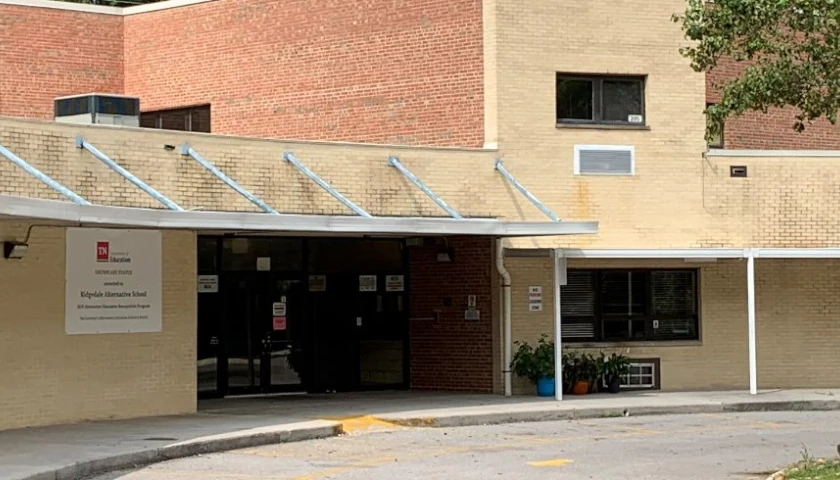Tennessee is scrambling to come up with ways to find and keep quality teachers in the classroom.
The state Department of Education released a report last week that details the problem and outlines proposed solutions that focus especially on strengthening ties with teacher education programs in the state’s postsecondary schools.
“More than 65,000 teachers show up each day to work in Tennessee’s public schools. At the current rate, half of these teachers will leave or retire in the next decade,” the report says.
Bethany Bowman, director of professional learning for Professional Educators of Tennessee (ProEd), calls the situation “a complete mess.”
“The Department of Education is too optimistic,” she told The Tennessee Star. “They’re always talking about highly effective teachers and I’m thinking, you’re lucky to get teachers period.”
Bowman noted that just days before the start of the new school year last summer, Metro Nashville Public Schools was still short 400 teachers. The district employs around 6,000 teachers.
As if simply finding good teachers weren’t enough, the state also wants to focus on making teaching staffs more diverse. The report said that only 14 percent of new teacher candidates graduating from Tennessee’s teacher education programs self-identified as not white in 2015-2016 compared with 36 percent of the state’s K-12 student population.
The problem with filling teacher positions has been growing nationwide in recent years. One significant factor is the number of baby boomers retiring. School districts began bracing for it years ago, but for a while the problem was not as bad as feared because the 2008 recession kept some teachers in the classroom longer. Now school officials are finding themselves in the challenging position of increasing their efforts to sell the teaching profession to millennials and career switchers.
Across Tennessee, the greatest needs are in English as a Second Language (ESL), foreign languages, and science. ESL programs offer specialized language instruction for students who speak a native language other than English. The growing need for teachers reflects growing rates of immigration. Programs are also sometimes called ELL or EL. The number of ESL-licensed teachers graduating from Tennessee universities has grown, but hasn’t kept pace with the increase in students, the report says.
Statewide, there were 50,000 ESL students during the 2015-2106 school year, or 5 percent of the student population, according to the state Department of Education. The largest concentrations tend to be in urban areas. Metro Nashville Public Schools has the largest population, with nearly 15,000 EL students in 2015-2016, making up 17.6 of the district’s student population. The district is asking for 31 new EL teachers in the proposed budget for next year.
The state is facing similar challenges with foreign languages and science in that the rate of new teachers receiving licenses to teach those subjects isn’t keeping up with demand.
However, the picture doesn’t look the same in every district.
“Districts each have their own distinct challenges,” the report says. “For example, the ESL gaps we see tend to be driven by many of our urban districts, while many of our smaller, rural districts have small, if any, populations of ELs. In contrast, our rural districts tend to have the greatest difficulty attracting world language teachers. We also see some districts facing challenges in areas where we did not find overall statewide shortages.”
The report also notes that high-poverty districts have a particularly hard time finding qualified teachers.
In recent years, teachers across grade levels and subject areas have reported feeling stressed because of bureaucratic mandates, a frenzy of standardized testing and disrespect from students and parents, in extreme cases involving violence or threats of violence. They also feel the public no longer holds the teaching profession in high regard.
“You’ll hardly ever meet a teacher who wants their own child to be a teacher,” said Bowman of ProEd. “It’s one of the most stressful jobs. It’s exhausting.”
Low pay is a factor in the teacher shortage, but stress is the number one reason, Bowman says. Bowman said education commissioner Candice McQueen is good at collecting feedback but wonders if officials at the state Department of Education fully understand the extent of the problem.
Proposed legislation called the Teacher Bill of Rights is advancing in the state legislature and calls for teachers to be treated with greater respect and have more opportunities to use their professional judgment. Bill sponsor Sen. Mark Green (R-Clarksville) told the Senate Education Committee last week that stories he heard from teachers across the state about their working conditions were “quite startling” and “shocking.”
Bowman believes that to address the teacher shortage, scholarships should be made available to young people majoring in education. She also said that alternative licensing programs should be expanded to help career switchers and others get in the classroom faster while they receive some training but not the amount of education currently expected. In addition, teachers need higher pay, especially teachers in high-need areas, Bowman said. Would-be teachers who are knowledgeable in areas like science have many other opportunities for higher pay in fields other than teaching, she said.
While teacher unions nationally have been known to push back against pay plans that deviate from a fixed salary schedule, the state Department of Education report seems to leave the door open to compensating some Tennessee teachers more to make a classroom job more appealing.
Districts have “extensive tools of their own for recruiting, developing, and retaining their staff,” the report says. “These include differentiated pay plans and teacher-leader strategies that help recruit new teachers by targeting particular high-need subjects or schools for bonuses, rewarding performance and defining clear pathways into leadership positions.”
The report also calls for “improved communications and collaboration” between school districts and teacher education programs. The state also plans to offer “additional trainings and webinars in recruitment best practices, understanding millennial job seekers and improved functionality of Teachers-Teachers.com.” The website provides access to job seekers across the country. For further support, Tennessee is partnering with seven other states to consult with each other on the best ways to find and retain teachers.
When teacher positions go unfilled, teachers without subject-area endorsement can step in or substitute teachers are called. However, school districts in Tennessee and across the country have also faced a substitute teacher shortage in recent years.
There also have been problems with filling positions for bus drivers.






I have been hearing about this shortage for years. I am/was a ‘highly qualified’ teacher in Science, including Chemistry, yet I applied with Metro Nashville schools for so many science positions and very rarely got a call back. I hand delivered my resume (etc…) to so many schools in person even, just to get a chance to actually talk to a principal. Still nothing…… was it my race? (which is white…) Who knows, it made and still makes absolutely no sense to me.
I got my certification through an alternative licencing program through UT Martin, I already had a Master’s in science, and eventually accepted a position with Williamson Co. I lasted 4 years. As a new teacher I did not have a classroom. I got to roll around room to room on a cart all day. Do you realize how little respect a teacher on a cart gets from students???? Lets not forget, unfortunately, other faculty members as well. I got given the ‘bits and pieces’ of what was left as far as classes. Which meant as a brand new teacher I would have 3, sometimes even 4, different classes to prep for. How is that OK? I had no life. My family, including my toddler son, was a distant memory…. The stress was mind-blowing, even after a Masters degree in genetics… Not being tenured, I never knew where or even if I was going to have job the following year. Do you know what it feels like to wonder all year long for several years if you’ll be able to pay your mortgage or feed your kid when fall comes? How is any of this OK? And not to mention I was under a microscope as a new teacher.
My point is this…. call it whatever you want, whatever enables these politicians and school leaders to sleep at night, I know the reality, and it is never mentioned. It’s not about being highly qualified, which is what all these so called ‘experts’ are CONSTANTLY screaming about. “Oh My! We need HIGHLY QUALIFIED teachers!” How about all these people step back and look at how these teachers are treated if you want to keep new teachers. No. One. Ever. Mentions. This.
I am personally surprised we have anyone willing to become a teacher these days.
[…] bill comes amid concerns about a teacher shortage in Tennessee. There are various factors for the shortage, but one that is often cited is the […]